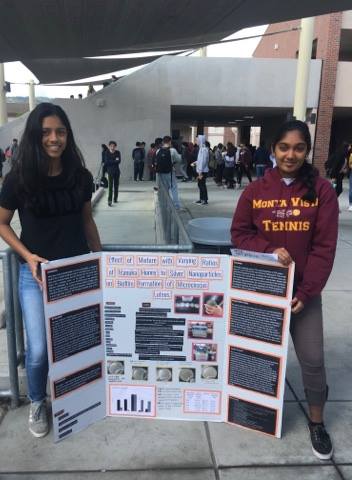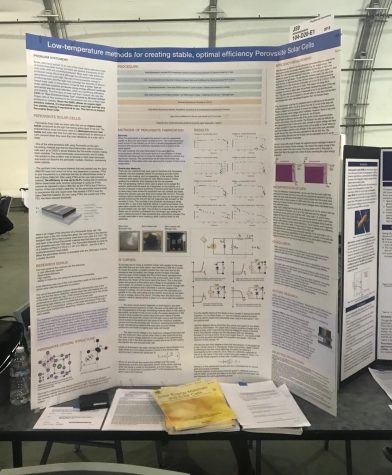MVHS students receive Synopsys Science Fair awards
Three Synopsys award winners share the story behind their successful research projects

Sophomore Ramya Chamkeri and her partner stand with their Synopsys Science Fair Championship research project in the rally court. Chamkeri’s project won an award in the annual Synopsys fair Championship. Photo courtesy of Ramya Chamkeri.
March 30, 2019
It is the end of March, with April just around the corner — for some, this entails studying for AP tests or focusing on standardized testing, such as SATs and ACTs, but for others, it means the release of the Synopsys Science Fair Championship results. The Synopsys Championship is a program where students around the Bay Area compete for an award in a research project. Beginning in January, students submitted a research project to Synopsys and were notified of whether or not they won in late March.
Sophomore Ramya Chamkeri submitted her Synopsys project about MRSA, a bacteria that can be resistant to antibiotics, and whether or not Manuka Honey with silver nanoparticles can be used to treat it. After an extensive process of growing the MRSA bacteria, creating mixtures with various ratios of silver nanoparticles and Manuka Honey, Chamkeri waited for 24 hours and observed bacterial growth using online software. Due to the amount of work and time she put into the project, Chamkeri was ecstatic that she would be representing MVHS at the Synopsys Science Fair.
“I think it’s [the science fair] a really great opportunity for anyone interested in science,” Chamkeri said. “Definitely time management played a large part, so you had to organize yourself and make a plan so you can figure out what you [are] going to do in advance. Then you have to follow through with that plan.”
Another Synopsys Science Fair Award winner, junior Iris Xia, approached her research project differently, focusing on environmental science. Part of the science internship program (SIP) at University of California, San Diego, Xia worked to understand the process of bioturbation, where worms grow in sediment and create changes in an ecosystem. Xia and her partner at Bellarmine High School spent ten weeks at the university researching and using online programs, such as natural language processing, to delve deeper into the subject. Through research, about bioturbation on databases, Xia explored how biotechnology has influenced bioturbation. However, there were some difficulties with the project over the summer.
“Pretty much over the summer we spent the first few weeks working on the code and literature and then we had to run the code, which didn’t work out because there was a power outage,” Xia said. “We spent most of the rest of the summer helping our mentor with projects and in the end we made it run.”
While students such as Xia were part of a summer program, other Science Fair winners such as sophomore Akash Dasgupta, decided to take up their own research. Dasgupta experimented with a new source of solar energy from a perovskite solar cell, which is more efficient than a traditional silicon solar cell. When Dasgupta was notified that his project won, he felt happy and accomplished.
“I was really happy that I fulfilled the goal of the project and be able to be recognized for my efforts.” Dasgupta said. “I know that the research was done well and what I did was completely my own, everything I did was completely honest as well and everything I did was worthy and I think in my eyes, it was completely worth it.”

















